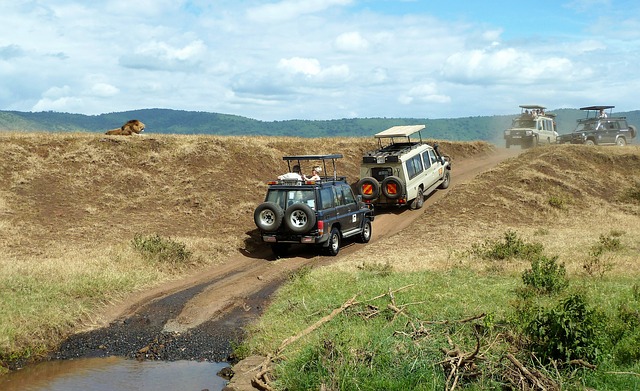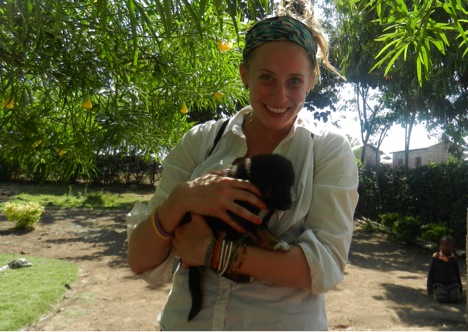Tired of Being Mzungu in Tanzania

I leave Tanzania in three days and it’s time to go. It’s been three months of cold showers, upset stomachs, and tough lessons, perhaps the toughest of which was this: I will forever be a tourist here. No matter how long I stay or how many local kids I love or how good my Swahili gets, I will never fit in. I can’t escape the label that my skin sticks bright and clear on my forehead. I am just a mzungu, only a white person.
That’s all there is to me. I am not a friend, not an enemy, sometimes not even a fellow human, but a representation, a generalization, water to oil. I am here to give things: my time, money, toys and clothes. These things are my identity.
A few times a week a volunteer like me, walking innocently along, not bothering anyone, is approached by kids or grown-ups (usually kids) who hold out a flat palm and demand in a hard voice, “Give me my money!” First of all, none of us carry large amounts of money with us because a) we don’t have much – we’re volunteers, remember? – and b) we might get mugged.
The habit of expecting money from mzungus is engrained in their culture. Somebody taught them this, and that somebody is not going to teach them otherwise.
Our standard response is to imitate them: we hold out our hands and say, “You give me my money!” But it never does any good. The habit of expecting money from mzungus is engrained in their culture. Somebody taught them this, and that somebody is not going to teach them otherwise.
As far as I can tell, the confusedness of race relations here for the most part stems from nothing more hostile than ignorance, passed down through the generations. There were maybe two or three Tanzanians on my flight from Amsterdam to Kilimanjaro; the rest of us were American or European tourists. Whereas in the west travel for leisure is a popular pastime, the majority of Tanzanians cannot afford such a hobby.
I don’t think they get out of their country much, and especially not off their continent.
Most of them don’t have televisions, cutting off access to documentaries and international news channels. They must eventually study history or geography in school, but I have no idea whether the national curriculum includes any study of Europe or Asia, for example, or North America.
No, I am not rich. I’m not poor like you, but I’m not rich like you think I am. One of the things I’m most looking forward to about going home is getting away from all the attention people pay us in the street here due one hundred percent to the color of our skin.
I know that my students didn’t even know Tanzania was part of Africa, so I’m not holding out much hope for the existence of vast world knowledge on their part. Due probably in part to this lack of understanding, everything is black and white to most Tanzanians I’ve encountered – literally black and white.
No, I am not rich. I’m not poor like you, but I’m not rich like you think I am. One of the things I’m most looking forward to about going home is getting away from all the attention people pay us in the street here due one hundred percent to the color of our skin. I often walk part of the trip to and from work with other volunteers.
Daladala conductors grab our wrists; taxi and bodaboda drivers shout after us offering rides; we hear hisses, catcalls, whistles, shouts.
Generally I choose not to respond, a habit acquired from months of receiving this treatment. If I’m in a good mood I’ll offer a simple, quiet greeting and/or a small smile in return.
Mostly people just holler “Mzungu!” or “Hey ‘zungu!” Generally I choose not to respond, a habit acquired from months of receiving this treatment. If I’m in a good mood I’ll offer a simple, quiet greeting and/or a small smile in return. Always dissatisfied, they keep yelling. They shout harshly at my back after I walk past: “Mzungu! Mzungu! Ay, mzungu! ‘Zungu! MA-ZUNG-U!”
These are not hostile greetings, but neither are they friendly; locals speak to me on the street in exactly the kind of tone you might use with a disobedient dog named Mzungu.
Our natural first reaction is to think, “Would you like it if you were walking down the street and I yelled ‘hey, black person!’ at you? Because it’s the same thing.” I want to inform these people that I do have an actual name, and it is not “mzungu.” That word’s definition encompasses, in my opinion, only a small portion of my identity – but to them, it’s all I have to offer. For this reason and for the manner in which it is often delivered, I’ve come to find it offensive.
I think that while it is not intended as such on every occasion, “mzungu” definitely crawls with shades of not-so-nice connotations, especially used, as one volunteer heard it, in the context of a hospital delivery room.
I think that while it is not intended as such on every occasion, “mzungu” definitely crawls with shades of not-so-nice connotations, especially used, as one volunteer heard it, in the context of a hospital delivery room. Women here give birth without much medication and if they scream or cry during labor, they’re mockingly called mzungus. That’s funny because it’s true, but not so flattering, hm?
Frankly, I have never in my life been on this end of racism and I hate it. But after I have time to cool down after particularly frustrating incidents, I consider that perhaps it’s good for me to feel this way, to be treated like this. I understand that people with so little might feel resentful of people with so much that they can afford to give it away, who can afford to work for free.
And so many people every day all over the world fall victim to abuse because of the color of their skin, but rarely does this happen to white people – we’re overdue for a little battering around, you might say. I’ve found that I don’t handle it as gracefully as I should.
I’ve found that I’m ready to go home and not hear that grating, segregating word ever again.

Tired of Being Mzungu in Tanzania
Related Reading
- Zanzibar Tourism: Describing My Home to the People of Zanzibar
- Girls Getaway to Zanzibar
- Volun-touring Versus Volunteering in Zanzibar
- The Truth About Zanzibari Men
- I Buried My Heart in Zanzibar
Have you traveled to Tanzania? What were your impressions? Email us at editor@pinkpangea.com for information about sharing your experience and advice with the Pink Pangea community. We can’t wait to hear from you.
Tired of Being Mzungu in Tanzania top photo credit: pixabay









Go home then. This whole article until the last paragraph is written with such a cynical tone. These are people living their lives and then here come these ZUNGUs interrupting everything. They are poor because of colonialism. The kids don’t know that, but they can feel the disdain of having a people destroy your future then come back to “volunteer” hundreds of years later. It is engrained in every facet of society. So please, go home and be comfortable in your space. Every POC in Europe and North America feels like an outsider and most of us are born and raised here. You got a small taste of being in somebody else’s home and you’re mad that they want to call you what you are? Zungu means “wander” or “spin”. Wazungu wandered in years ago and wandered out with 1/3rd of the African population so you’ll get over a little name calling.
I lived in Dar Es Salaam for 5-1/2 years. My neighbors and fellow workers called me “Baba Ayo”–the name of my oldest child.
Hi. I stumbled upon your post as I was looking for associated content with mzungu. (I have another blog in mind, I might call the mzungu chronicles).
Sorry about your experience. I can understand it being a mzungu myself, I spent a good bit of my teens in East Africa, Kenya mostly. And yes, we will never cease to be wazungu.
I hope you have recovered and that your African experience is slowly filtering out the bad to keep only the good.
Cheers (Kwaheri sassa) 😉
Brian
Wow! I feel really sorry for Amanda and any other person with the same experience in Tanzania. I am a Tanzania, born and raised here. And yes i never understood it myself at a young age i would scream mzungu if one crosses my street. Point fingers so my friends would also see. Back then shouting that word didn’t mean being racist. Kids are mostly innocent and know nothing about descrimination. For us we grew up believing that white People are superior more like heroes that we see in movies. Yes rich too because of how many are potrayed on television and so on. So i would screem mzungu being happy to finally see one, proud actually and if she or he smiled at me then that was a bonus. I Dont know about today but i know most kids…the unfortunate ones who dont have much exposure and knowledge would only call Mzungu to get attention in the hope of been seen or even talked to. To them it is like meeting a celebrity. They have it in their mind that the white people are rich so again it could be the stories told, history or pure ignorance but has nothing to do with racism. I have been there and done that. Now being a grown woman i partly understand why kids would screem mzungu” or even run up behind them as they walk maybe to touch their clothes or hands. Then they would go home saying they saw one and spoke to one and touched one. I dont know how to really put it but its more like pride for them. And as for the grown ups…the daladala men and bodaboda drivers, businesemen or women on the streets its almost the same thing. Assuming the white People have money, give tips, are kinder and nicer. So they call out to make them use their services or buy their products thinking they wil pay good money. It is because we are à developing country and we stil have a lot of uneducated brothers and sisters and worse it could be the culture too. Our beliefs have a lot to do with how we see the world and the people. I am sure it is not hate to the other race but more like seeking for help and attention. Most Tanzanians reading this would agree that we love white people, if anything we are even proud to be seen as one of them. Dress like them, speak like them and even think like them. Because we believe they are good. I feel so sad because most of them dont feel good about how we view them ‘ATM’ thingy…and again it is all about the culture and beliefs. Still all that being said i know a lot of white people who have stayed in Tanzania shortly or longer but have had the best time. It’s about how you choose to see it as, if you stop shake à few hands or just wave it wont make a big difference but again if you laugh it off and move on you might Just be as understanding as you can be. Tanzania is a very peaceful country, if you stopped to ask for direction or information to one person…two others would come over to hear you out in the hope of providing better help…and again if they ask for money out of it just apologize for having Non and slowly walk away. Everywhere in the world people seek opportunities..good people too, its worse in developing countries. But they wouldn’t hurt you or even talk back because they have nothing against you but simply Just trying their luck.